B.R. Sanders's Blog, page 10
May 20, 2016
Book Review: A STRANGER IN OLONDRIA
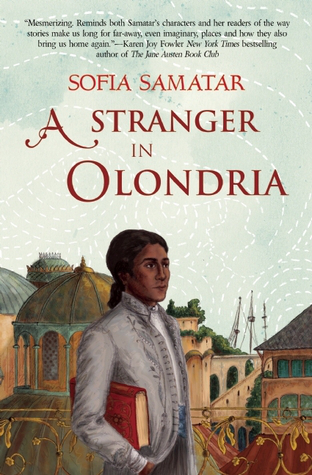
Notes on Diversity:
This is a book written by a woman of color about a man of color trying to survive in a foreign land. His culture and his worldview are centered and normalized in the book.
The book also has much to say on topics of mental health and disability; a substantial section midway through takes place in what is essentially a mental health facility. This section is remarkably kind and tender, unlike many representations of mental health care often seen in fiction.
Review:
WHY DID IT TAKE ME SO LONG TO READ THIS BOOK. Not in terms of time, but, I mean, why didn’t I find and read this book sooner? Why didn’t I hear about this book three years ago, when it first came out, and devour it then? Why did I only stumble across it now?
A Stranger In Olondria is the story of Jevick, a pepper merchant’s son on the island of Tyom who is destined to sell his goods to the countrymen of Olondria. His father sends for an Olondrian tutor to teach him how to read and write, to learn the language, to trade with the strangers in that far away country with a fluency he himself never had. Jevick waits for his chance to go to Olondria, this place he only knows from his tutor’s memories and from the descriptions of the books his tutor brought to Tyom. Once there, things are different. Some things are better than he imagined. Some things are worse.
And then the tale takes a turn: Jevick’s fate becomes tied to the fate of a dead girl from a different island. She reaches out to him, keeps him from sleeps, brings him to the brink of madness, and forces him to stay in Olondria even while his companions return to Tyom. The narrative twists and twists again as Jevick has to negotiate with his ghost.

Jissavet, to Jevick
Oh, there is so much to love in this book. Jevick’s love of the written word itself–even as literacy serves to divide a population alone classed lines–so reminded me of Hild. He, like Hild, sees magic in words, in their permanence, in their literal power to cross time and space. Over and over, Jevick returns to books when he needs solace. As a child, they are his refuge from his unpredictable and mysterious father. As a man, they are the way he first understands Olondria. And later, when things go sideways, he uses the written word to cling to his disordered life, to keep himself together, even as Jissavet’s ghost hounds him. Finally, it is the act of writing stories down that serves as liberation–for someone else, and for them, for him. But the politics of literacy, who has it and who does, is not lost here.

Me, and Hild, and Jevick
A Stranger In Olondria is a ghost story, but it’s not a book about death. Not really. It’s a book about living. I think it would be easy to say it’s a book about love, and that’s partly true, but even then, it’s really about living. Or, more blatantly put, I think it’s a book about learning how to actually live, actually sink your hands into the bloody mess of your life and get into it instead of primly edging around its corners. It’s about seizing every second of life you can, and not in a violent way, or a vicious way, but with joy and with bittersweetness, and with the knowledge that time is limited and all the knowledge you have gathered may do nothing to prepare you for what is coming the next moment. It’s one of those wonderful small/epic big/quiet books. One of those books that zooms in on one person, one not-all-that-important person and allows you to really feel that person’s trials and tribulations. And because that person is not-all-that-important, the sweeping epic of their small scope of life is relatable, and their joys and victories are even more keenly felt.
Sofia Samatar’s prose is truly beautiful. Phenomenally, fantastically beautifully. Check this shit out:
In my room, in my village, I shone like a moth with its back to a sparkling fire.
Time unrolled in the Houses, monotonous as a skein of wool.
Samatar is just a wizard with words. Her prose is precise, and fluid, and cutting. And honest. The style here is definitely reflective of Jevick–patient, a smidge of purple, a young man who is enamoured of books, who pauses, who waits until he can’t wait anymore. I’ve read enough of Samatar’s short fiction to know that she can write in other styles (also beautifully). But the imagery she conjures up again and again her just floored me.
There was a sentiment, introduced near the end of the book, that really got me: that we should value “not what will make us happy, but what is precious.” I’ve been rolling that over and over in my mind. Sometimes, in the best cases, those are the same thing. But they are so often not. To see Jevick’s choices in the novel in light of this piece of wisdom, from beginning to end, is striking. To see my own life organize along these lines–when have I chosen happiness over what is precious? When have I chosen what is precious over happiness? When were they the same?–is more striking still. A Stranger In Olondria is in me now, riding in my marrow. It will be a book, like The Left Hand of Darkness, that I’ll end up re-reading every few years. I can feel it coming.
Want posts like this delivered to your inbox? Sign up for my newsletter!


May 18, 2016
Short Story Rec: NETTLESTINGS by Sarah Caulfield
“Nettlestings: A Fairy Tale” was published in The Myriad Carnival: Queer And Weird Stories From Under The Big Top. You can read it here.
They asked him if he could fly and he said not anymore, said I used to, said I forgot how. His eyes peeled naked, they looked away from the desperation there and shrugged, said that’s fine, said it doesn’t matter, said we could use you anyway.
We could use you anyway, and there it is, there’s the thing, that last and single poignant thing: he had never felt of use before. He was a curse, a burden his sister carried upon her back, a guilty smear upon her brow: but not useful, never useful.
Caulfield’s story is a queer, magical retelling of “The Six Swans”. What happens to that last brother? The one that gets the unfinished shirt, the one with the missing sleeve? This story gives him an ending.
“Nettlestings” follows that brother, named Leda, as he runs away and joins the circus. There he finds some comfort, some solidarity. He’s a wounded creature, a wary boy. There, he meets Artemis: a mechanical boy made of jewels bewitched into life who can’t speak but can only sing, whose face is frozen into a single expression but who can feel the wide variety of life’s emotions anyway. And of course Leda and Artemis fall for each other, these two impossible boys, and of course I am rooting for them, days after finishing the story. Also, I loved that these two magic bird-boys had the names of Greek mythological heroines.
The writing is skilled: poetic without being gimmicky, flippant and casual but still polished. I will be watching out for more of Caulfield’s fiction.
Want posts like this delivered to your inbox? Sign up for my newsletter!


May 16, 2016
Where Did All My Words Go?
I’ve written very little in 2016 and the year is nearly halfway over.
I’ve got a story that’s gone nowhere, that I need to raze to the ground and rebuild from scratch. I’ve got a very bloated draft of a book, one that I have started butchering down as a book, and a novella, and at least one standalone short story. And I have a single short story that I have written in its entirety this year from scratch. That’s about 13,000 words not counting blogging and some various edits on other projects. This time last year, for comparison’s sake, I was at 88,875 words.

“Whatcha working on?” “Trashpiles and blank pages”
So where did the words go?
I’m not blocked, exactly. I have a ton of new ideas (there are like five or six notes in my google keep tagged as story ideas right now), and I have a number of projects that are in various stages of edits. My creative juices are there–I’m all itching to do stuff any kind of stuff. I keep having these urges to start a web comic or a new knitting thing or take a pottery class just do creative stuff.
The thing that is all janked up is my routines.
Every since I broke my ankle, my life has been barely controlled chaos where before it was a finely calibrated machine. I did almost all of my writing on the bus on my commute into and out of work. While my ankle slowly recovered these last few months, I first worked from home, then slowly started going into the office again. But I wasn’t taking the bus; one of my partners drove me in and back. No commute=no dedicated writing time. No clear delineation of work/home space=no dedicated writing space. Everything bled into everything else. And! Recovery is really hard! Emotionally and mentally draining. Lack of spoons=no mental energy for writing.

that didn’t go as planned. turns out books don’t write themselves.
I can walk now, but only kind of. There’s a definite limp*, and I can’t walk nearly as far as I used to without stopping, so I’ve had to adjust my bus route. Now I’m on the express bus, on a different route, which is shorter, more crowded, and also more interrupted. It’s not as good for writing.
I need to create new routines. No routines=no writing. I’ve got a plan; let’s see if it works. In the mean time, I’m trying real hard to remember that writing is a marathon, not a sprint, and that a four month dry spell is a blip on the radar, not a condemnation of all my abilities.**
*Y’all that ankle was shattered. Twelve pins in that ankle, and they are never coming out.
**THANKS SEVERE ANXIETIY DISORDER, GLAD TO HAVE YOU HERE.


April 22, 2016
Book Review: VALOR ANTHOLOGY

Notes on Diversity:
Valor is a comic anthology specifically focused on diverse retellings of folk and fairy tales with an emphasis on women and girl protagonists. The girls and women here are not all cis. (YES.) There are brown and black and Asian heroines here. There are chubby heroines. There are queer heroines!

Seriously, the diversity here is loving and lovely.
Review:
I found Valor because a friend of mine found “Little Fish” on tumblr and sent it to me, and I fell in love. Diverse mermaids! Genderqueer love story! I was like WHAT IS THIS IS THERE MORE IF THERE IS MORE WHERE IS THE MORE.

Turns out there was more! An entire anthology of more!
Fairylogue’s Valor anthology is a collection of 19 comics and 5 illustrated stories. I read the anthology with my kid, and both of us were captivated by the beauty of the art and the clever retellings.
As bedtime stories, Valor worked especially well for us because our family is queer (we’re poly, and I’m trans) and multiracial (I’m White, kid’s dad is White, but his mom and aunt are Latina). It was so refreshing to see stories where families and people like us were the norm instead of the outliers.
That’s not to say this is a children’s collection. It isn’t. I loved reading the anthology on my own, for myself, too. The reason it became bedtime story material to begin with was because kiddo saw me reading it and got interested.
This is a seriously good collections. Standouts include the aforementioned “Little Fish”, but also “Black Bull”, “The Bride of Rose Beast”, “Lady Tilda”, and “Nautilus”. Kiddo returns again and again to “Masks” and “Godfather Death”.
Want posts like this delivered to your inbox? Sign up for my newsletter!


April 20, 2016
Debrief: “The Sharpshooter”

Never look too close at anything in the Myriad Carnvial; everything there is an illusion. Beneath the makeup and the wig and the costume in the gunslinger’s tent is Yves: French, genderqueer, armed with an enchanted gun. Trouble comes for Yves, but what happens when the West’s best shot is no great shot at all?
Publication date: 2/17/2016
Completion date: 7/31/2015
Number of times subbed:
Just once. I saw the call for queer and weird stories under the big top that Matthew Bright, the editor, put out on twitter, and could not respond fast enough. I’d worked with Matthew before, and he gave me the go ahead to put something together. I was THRILLED.
The story of the story:
I immediately had three of four ideas for queer and weird stories. The one that kept sticking and building out in my mind, though, was spurred by something that Matthew had mentioned: that there had been a weird west story slated in the anthology, but that the author had pulled out, so there was a hole, now. That plot just came together so fast, and so thoroughly.
“The Sharpshooter” is ultimately born from that seed–a weird west story where once you scratch the surface nothing is what it seems. Of course a western has to have a gunslinger, a suave and rakish gunslinger who ends up fighting a duel for their life. That’s the core of the story.
The fun part was digging into the nuts and bolts of this story. Why was this character a gunslinger? How did they end up at the carnival? What, exactly, was up with their gun? Were they going to get out of this scrape in one piece against all odds, and if so, how? It was an enormously fun piece to write.
Placing the story:
Easy peasy! This was one of those lovely times where the stars align, and the call to which you wrote the story actually accepts it.
Want posts like this delivered to your inbox? Sign up for my newsletter!


April 19, 2016
Disrupting Publishing Linkspam: 4/19/2016
It’s that time again: that time every week where I round up links to articles written by marginalized people pushing back against oppression in publishing. I’m aggregated as many marginalized voices as possible from as many vectors as possible, and the more intersectional the better. As always if you’ve read something I missed please link it in the comments.
“‘You Will Be Tokenized’: Speaking Out About the State of Diversity in Publishing” by Molly McCardle for Brooklyn Magazine
Publishing doesn’t exist in a bubble. Systemic and individual racism, misogyny, trans- and homophobia, ableism: these structure and surface in every American workplace. But publishing’s deadening sameness is unusual, and it makes for an unhealthy book culture. Of the 3,500 children’s books reviewed by the Cooperative Children’s Book Center in 2014, only 400 were about indigenous peoples and people of color. Only 292 were written by an indigenous person or person of color. For every one indigenous writer or writer of color who was published, there were 12 white writers. This is the sort of staggering that makes you laugh-cry, or angry-cry, or angry-laugh. It is too big for just one emotion. It’s also unfair. Inequitable. Immoral. Bad business.
Native People Respond to Rowling by Deb Reese
But this short story? Their reaction to it was different. They read the first line, with its monolithic “The Native Americans” was bad, but each paragraph of that short story was laden with troubling misrepresentations of Native peoples.
Things I Wish I Knew: 5 Things To Know When Writing Diverse Characters by Dahlia Adler
If you’re writing outside your lane, deeply consider what already exists by creators of that group and how you can support them as well. Deeply consider why you have chosen this perspective, and why yours is a necessary voice on it.


April 15, 2016
An Interview with Foz Meadows, author of CORAL BONES
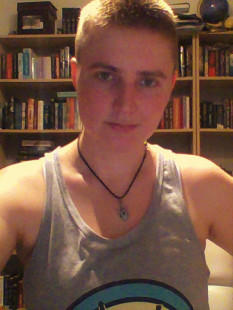 I am SO EXCITED to have Foz Meadows drop by the blog today for an interview! Foz generously agreed to answer some questions about her wonderful novella, CORAL BONES.
I am SO EXCITED to have Foz Meadows drop by the blog today for an interview! Foz generously agreed to answer some questions about her wonderful novella, CORAL BONES.
Foz Meadows is a genderqueer author, blogger, essayist, reviewer and poet. In 2014, she was nominated for a Hugo Award for Best Fan Writer for her blog, Shattersnipe; she is also a contributing writer for The Huffington Post and Black Gate, and a contributing reviewer for Strange Horizons and Tor.com. Her third novel, An Accident of Stars, is due out from Angry Robot in 2016.
The Miranda in CORAL BONES is such a different Miranda than the Miranda from The Tempest, even in the flashbacks. So much sharper, and more clever, and in the present sections, she’s seen and done so much more. How did you take the source material, where Miranda is hardly even one dimensional, and flesh her out to deeper character?
The heart of all fanfiction – and let’s be honest, writing about someone else’s characters is always going to be fanfiction, even if it’s Shakespeare – especially if it’s Shakespeare, actually; we revere him now, but it’s not as if he shied away from making a dick joke or twenty back in the day – is always in the gaps. And Miranda, fundamentally, is a creature of more gaps than substance: her entire existence is conditional on her convenience to the male characters, because she was written, quite deliberately, as an idealised personification of feminine virtue. Which means, from a fanfic perspective, there are plenty of gaps to work with: all you have to do is find an entry point, and ask enough questions to get the ball rolling.
My entry point for Coral Bones was Prospero’s initial conversation with Miranda, and everything it implies. Prospero says he’s never told Miranda that she’s a princess, even though they’ve been stranded together for over a decade – and then, when her presence becomes inconvenient, he puts her to sleep. When she wakes again, it’s clear she doesn’t realise he’s responsible, which makes you wonder: how often has he done this? When did he start? And what does this say about how he’s raised Miranda? Because of the way The Tempest is structured, we’re not encouraged to think of it as challenging gender roles – Miranda’s marriage to Ferdinand rather gives the opposite impression – but the fact remains that Prospero has been raising his daughter as a single father, a task he is culturally and socially ill-equipped to perform. And he’s a nobleman, too: Miranda’s one flashback to life before the island involves multiple female servants taking care of her, so it’s reasonable to infer that Prospero, when they first arrived, was wholly out of his element.
That being so – and as the only resources at his command were magical – it makes perfect sense that, as a nobleman and a scholar, Prospero would delegate the primary care of Miranda to his androgynous servant, Ariel. Which means that, straight away, there’s going to be a tension in her that Prospero doesn’t necessarily recognise, because Ariel isn’t human – isn’t even male or female, but a genderfluid spirit – and so whatever Prospero tells his daughter about her role as a woman, which is later reflected in how she behaves with Ferdinand (and how, to a lesser extent, she behaves with him), it’s hard to imagine her being the same with Ariel when Prospero isn’t watching; that growing up under fairy guidance wouldn’t have an impact on her knowledge and curiosity. And we know, canonically, that Ariel is bound to serve Prospero, which gives them a kinship of sorts with Miranda, yet also curtails how obviously they can influence her, and in what ways.
This is what I mean when I say that Miranda’s existence, canonically, is conditional on her convenience to the male characters: all that matters is what they see of her, and so that’s all we see. But if you consider her as an individual – if you imagine her internality, separate to her perception, in the context of her raising – then you’re left to draw one of two conclusions: that either Miranda behaves as she would for a male audience at all times, even when alone, or there’s an enormous part of her that we’re not seeing, and a reason why it’s hidden. And as the second option is much more narratively interesting, even if it’s not what Shakespeare intended, that’s what I chose to write.
Years ago, I encountered a striking comment on Jane Austen’s writing: that she never depicted a scene in which two men were alone together, because she was worried that, never having witnessed such a thing herself, she wouldn’t be able to depict it with any degree of accuracy. And yet her male characters are wholly three-dimensional, because – to paraphrase what Dorothy L. Sayers once famously said on the same subject – she was nonetheless aware that men are people: that, even if they behaved differently when she couldn’t see them, those differences remained salient to their personhood without invalidating her perception of them otherwise. And yet there’s a whole body of supposedly classic male writing which fails to extend the same courtesy to women: which constructs them as though their visibility to men is the be-all, end-all of their existence. Which is, partially, the fault of cultures which have, for centuries, treated women as though this were literally the case; and yet it’s also a failure of imagination and empathy in a field which, by its nature, ought to abound in both. Women have never had the luxury of forgetting that men exist in spaces where they themselves are absent, because the business undertaken in such spaces has nonetheless directly impacted their liberties. Whereas a great many men, it seems, have been able to either ignore the existence or elide the importance of women’s spaces, because they believed – however inaccurately – that nothing which went on in them was relevant to men, or represented a threat to their freedom. That’s the difference between Mr Darcy and Miranda: even when viewed by women alone, the former is written as though he still exists beyond their gaze, while the latter is presented as nothing more than a construct of male attention.
Unless, of course, we dig into the inherent contradiction of any person being thus defined, and make a new story out of it.
~
What was your favorite part of writing CORAL BONES, and why?
It was immensely cathartic to write Miranda as genderqueer, but Puck was extraordinarily fun to work with, too. A Midsummer Night’s Dream has always been my favourite Shakespeare play, and I’ve got a decided soft-spot for mythology’s tricksters. Figuring out how to make Puck helpful without betraying his mischievous nature was very satisfying – as was crafting my own interpretation of the fairy courts.
~
Where does CORAL BONES fit with the other novellas in the MONSTROUS LITTLE VOICES series? Did you know what the order would be when you wrote it, or was that determined after the fact?
Once the editor, David Thomas Moore, signed the five of us on for the project, he set up a group pages where we could jointly discuss the stories we wanted to tell and the characters we wanted to use, complete with his own notes about the overarching structure – history, worldbuilding, magic – for use as references. We went back and forth with our ideas, and once it was established that everything could fit together without contradiction, we went to work. I think I was vaguely aware that Coral Bones was first up chronologically, but I didn’t quite realise that meant first in the anthology until the novella was being released!
~
Compared to your other work (say, your upcoming novel, AN ACCIDENT OF STARS) was it a different process to get the voice right for this piece? To get that hint of Shakespearean cadence and poetry in there without going overboard? Or do you tend to fiddle with style a lot anyway?
I was definitely worried about getting it right! I didn’t think I could pull off actual Shakespearean dialogue, so adopting a first-person poetic style seemed like a sensible way to reference the original language while still writing in my own voice. An Accident of Stars, by contrast, is written very differently – third person, multiple POVs – with an eye to different details. I’ve always had a fairly versatile writing style, but it’s definitely improved since I started immersing myself in fanfiction. The whole idea of writing something just for yourself, as a deliberate subversion of canon and convention, is immensely freeing, and it’s given me a much stronger idea of my own abilities. I heartily recommend it!
~
How can readers stay in the loop and get news about your projects and releases?
I tweet, tumble and blog as Foz Meadows, which isn’t exactly a common name, so I’m pretty easy to find online. I do tend to ramble about a whole bunch of stuff, though, so anyone who’s interested purely in my fiction updates – and not, say, a lengthy paean to my feelings about Dragon Age, Teen Wolf or whatever other dumpster I’m currently occupying – might want to brace themselves.
~
Anything else you want us to know? Shout-outs? Words of wisdom?
I AM THE LIZARD QUEEN!*
*Translation: I am a terrible dork.


April 13, 2016
ARIAH makes the 2015 Tiptree Award Longlist!
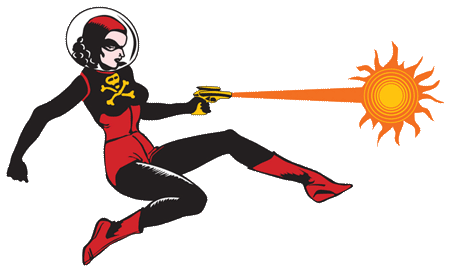 If you don’t know, the James Tiptree, Jr Literary Award is given to works of speculative fiction that push the envelope in terms of gender and sexuality. Works that address gender and sexuality in science fiction and fantasy are my definite jam; I regularly sift through the Tiptree recommendation and long lists when in search of something new to read.
If you don’t know, the James Tiptree, Jr Literary Award is given to works of speculative fiction that push the envelope in terms of gender and sexuality. Works that address gender and sexuality in science fiction and fantasy are my definite jam; I regularly sift through the Tiptree recommendation and long lists when in search of something new to read.
So! To be nominated*, much less to find myself on the longlist of this incredible award, for something I wrote is an honor. Massively so.
I saw the announcement on twitter** and was basically like this:
IN ANY CASE, I am in such phenomenal company! If works that explore and expand notions of gender and sexuality through spec fic is also your jam, I very much encourage you to check out the winners, honor list, and long list of this year’s Tiptree Awards. You will totally find something worth reading (or watching!).
Tiptree-ish Recs:
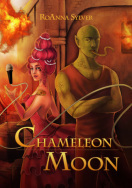
CHAMELEON MOON, by RoAnna Sylver, is just wonderful. It’s flown under the radar for far too long, and it’s tough and smart and a celebration of all things queer. It’s got all of the following: a trans woman heroine, so MANY queer love stories of so MANY varieties, an explicitly non-binary character, and more, all of which are totally normal and treated with respect! (full review here)
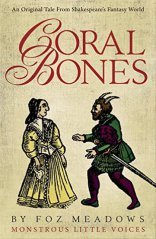
Foz Meadows’ CORAL BONES is a retelling of The Tempest, but the best thing about is its protagonist: a grown-up, genderqueer Miranda. Miranda’s experience is at once complex and simple, something that she, herself, understands even if the world around her doesn’t. (full review here).
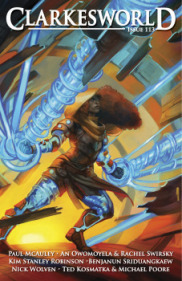 Gender in Benjanun Sriduankaew’s short story “That Which Stands Towards Free Fall” is fascinating, reflective stuff. This story has stuck in my craw for weeks now, specifically the gender (or lack thereof) of the AIs. There’s one that has a gender which she self-determined. There’s many that do not have genders. And there’s another with what, I think, would be best described as a performative gender. It all relates to how the AIs relate to the humans around them, how they’re allowed to relate to the humans around them, which, again, says so much about gender, doesn’t it?
Gender in Benjanun Sriduankaew’s short story “That Which Stands Towards Free Fall” is fascinating, reflective stuff. This story has stuck in my craw for weeks now, specifically the gender (or lack thereof) of the AIs. There’s one that has a gender which she self-determined. There’s many that do not have genders. And there’s another with what, I think, would be best described as a performative gender. It all relates to how the AIs relate to the humans around them, how they’re allowed to relate to the humans around them, which, again, says so much about gender, doesn’t it?
*IT WAS A WHOLE SURPRISE THING WHEN THE COMMITTEE WAS ALL “Send me ur books plz” BECAUSE IT DIDN’T NOMINATE MYSELF.
**AT FIRST I DIDN’T THINK IT WAS REAL BECAUSE THE LIST WAS ANNOUNCED ON APRIL 1ST.


April 12, 2016
Disrupting Publishing Linkspam: 4/12/2016
It’s that time again: that time every week where I round up links to articles written by marginalized people pushing back against oppression in publishing. I’m aggregated as many marginalized voices as possible from as many vectors as possible, and the more intersectional the better. As always if you’ve read something I missed please link it in the comments.
The 2015 VIDA Count: The Year of Intersectional Thinking
Why would you consider such information? you might ask. VIDA has a history of advocating for women’s voices to be heard. An intersectional approach, such as looking at these demographic factors, is a natural development necessary to deepen the conversation. We want to take a closer look and identify what factors affect all women’s representation. This next step requires asking how those factors might affect certain populations of women writers when it comes to publication rates.
“Women built this castle”: An in-depth look at sexism in YA.
“This phenomenon of male writers being hailed as the ‘saviours’ of female-dominated genres can also be seen in the recent popularity of young adult author John Green, writer of The Fault in Our Stars. Young Adult fiction has been around since the 1980s, with females writing profusely in that genre for decades,” said Nudrat Kamal in her piece on sexism in literature for the Tribune, noting how many lady YA authors are “rankled” at the idea that it took a man writing YA to make YA a worthy career choice for a writer or a category of literature to consider seriously as a reader.
On Blindness and the Portrayal of Marie-Laure in All the Light We Cannot See
But I am not here to complain about misrepresentations of adaptive techniques or tired blindness stereotypes. I honestly don’t care if Marie-Laure counts her steps, reads braille with her thumbs, hears the ocean from her sixth-floor window, or can detect the scent of cedars from a quarter-mile away. The assault on the dignity of blind people is not that this character has strange adaptive techniques, or even that there are so many things she does not do for herself; it is that she is utterly without agency as a character.
(Not) Engaging with Disability: Convenient Approaches in SFF
It’s also important to consider that, instead of finding common limitations to the tools or treatments that exist in your world, you might not even need to. What if your character doesn’t use these options in the first place?
There are many reasons a workaround might not be accessible to your character. They might be incredibly expensive, or only available through specific providers. They might be rare, difficult to locate, or so brand-new it’s not even something they’ve considered. And on and on.
Think about reasons your character might choose not to adopt assistive tech, undergo a medical procedure, turn to magic as a cure, etc.
You fold your arms. “Let me guess,” you say, bitter, “it’s another queer tragedy. Because our suffering sells. Because that’s all you can see for us is coffins and mourning and broken hearts.”


March 21, 2016
ARIAH is a finalist for the Bisexual Book Awards!
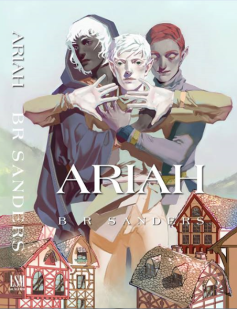
Exciting news! Ariah is on the shortlist for the Bisexual Book Awards in the Speculative Fiction category! I’m super-thrilled simply to be nominated (no, really, I mean that)–especially because of the fine company I’m in!* Seriously, there’s about a half dozen other finalists that are very high up on my TBR pile right now. Are you looking for some bisexual books to read? You might want to check out the list of finalists!
OK HERE’S SOME MORE NEWS:
In celebration, I’m going to release an Ariah-related short story via Patreon in April! So…if that’s of any interest to you, then yay!
*Including but not limited to Shira Glassman, Hannah Moskowitz, and Lidia Yuknavitch.





